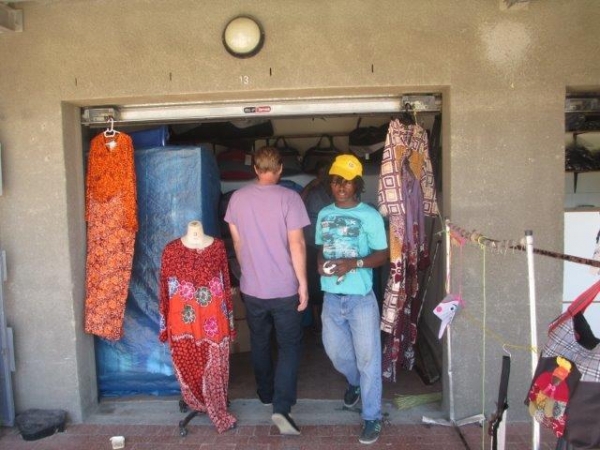

Traders say there are constant robberies and petty thefts in Harare and at times their merchandise is stolen as well. Photo by Mary-Anne Gontsana.
26 September 2014
The recently released Western Cape crime statistics of 2014 deem Harare as one of the worst of 10 areas in Khayelitsha, plagued with increasing crime despite the Violence Prevention through Urban Upgrade Programme (VPUU).
The VPUU is meant to work on rebuilding and re-designing urban spaces that have been identified as crime hot spots.
Western Cape Premier Helen Zille and community safety MEC Dan Plato, handed over a safety kiosk to the community of Khayelitsha in partnership with the VPUU on Monday, in what was described as an initiative “to increase safety in communities”.
The kiosk will serve as a link between the police station, private security providers, the neighbourhood watch, the community policing forum and the community.
But traders within the VPUU area say that crime has always been the norm, and the volunteers who are supposed to be acting as security guards run away whenever faced with a problem.
Harare’s statistics show that robbery with aggravating circumstances has risen significantly from the 2012/2013 year, from 627 to 842. This is followed by common robbery, from 198 to 238. The number of murders has increased from 132 to 164.
Zenande Phillips, who works at one of the shops, says people are robbed almost everyday in Harare in broad daylight. She had not heard about the safety kiosk.
“Here you cannot even walk around with your phone in hand, because it will get taken. There are no securities [security guards] around, but at the end of the day, the securities are also people and they are also scared. Crime around here is known by everyone, people’s merchandise is taken right in front of them, and no one can do anything about it, because the thieves have knives and guns,” said Phillips.
Another trader, Nomsa Moyi, shared Phillips’s views about the crime and said nothing is being done about it and it has been like this for a while.
Deputy General Secretary of the Social Justice Coalition (SJC) Dustin Kramer said the kiosk was a positive thing “but it cannot happen in isolation. Is this part of a bigger plan?”
“It just looks like an isolated kiosk which doesn’t help eradicate crime. The statistics are unbelievable, this is one of the reasons for the establishment of the commission of inquiry and we feel that the City of Cape Town didn’t come to the party or cooperate the way we would have liked on the crime situation,” said Kramer.
Sibusiso Momoti, who works at the Harare public library, said there was a lot of robbery going on in Harare and people were targeted mostly when they were returning from work.
He said the security guards, “young guys, who looked like students” could not do much, and robberies also happened when they were off duty.
Plato said his department would intensify its efforts to build “capable partnerships with NGOs and the religious fraternity within Khayelitsha”.
Apart from the mobile safety kiosk, Plato said 30 young people had been trained and deployed within Khayelitsha in partnership with the VPUU.
VPUU team leader Michael Krause said they were working very closely with the City of Cape Town, law enforcement and community safety to ensure safety in Harare. He admitted that there had been security measures that did not work, but these were done away with.
According to Krause, the VPUU received complaints of crime about once a month and they were working together with the traders to solve the problem. Regular meetings, at least once a week, were held with traders where they were allowed to interact with the VPUU about their concerns.